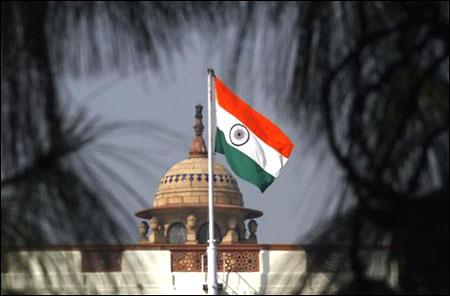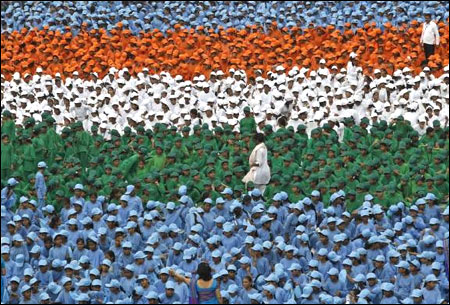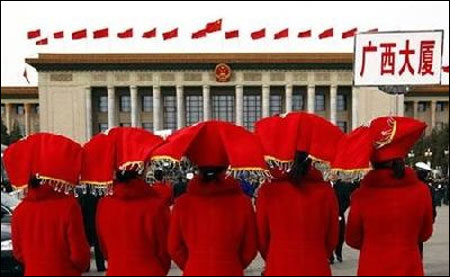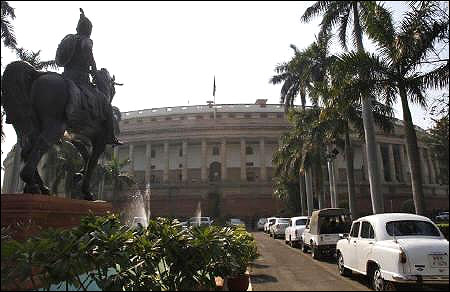Photographs: B Mathur/Reuters Shyam Saran
Unlike China, India has not clearly embraced its post-reform policy direction.
The benchmark against which most Indians judge their country's performance is China. The rest of the world does the same - though China itself, with some justification, treats such comparisons with disdain.
As India celebrates its 66th Independence Day, it must confront the unpleasant but compelling reality that against most measures of economic and social development, China is significantly ahead of India and the gap is growing wider relentlessly.
This is notwithstanding the general expectation that China may now be entering an era of slower growth with an ageing population.
Click on NEXT for more...
India's next tryst with destiny
Image: Schoolchildren take part in the Independence Day celebrations in front of the historic Red Fort.Photographs: Adnan Abidi/Reuters
The factors often cited to argue that India will catch up, such as a young population, a high savings rate or a dynamic and outward-looking entrepreneurial class, do not guarantee an inevitable and automatic outcome as some of prevailing commentary would suggest.
Without a massive investment in skills and education, a rising youth population could turn into a demographic disaster rather than pay a demographic dividend. A high savings rate may evaporate if inflation continues to erode citizens' assets.
And dynamic entrepreneurs may well seek greener pastures in foreign realms if the investment climate at home continues to be uncertain.
Any complacency born out of a sense that India's rise in Chinese fashion is somehow predetermined must be given a quick burial. There was no inevitability about China's rise.
Its rise is the outcome of national choice. India, too, must choose whether it is content with muddling along or should make the difficult and sometimes risky choices that could give it a fair shot at great power credentials.
Click on NEXT for more...
India's next tryst with destiny
Photographs: Carlos Barria/Reuters
In comparing India to China, we often point to our civilisational heritage, our role in shaping Asia's cultural identity, and our long history as the world's largest and richest economies before the age of imperialism and colonialism reduced both countries to the ranks of the poor and backward.
China has a clear sense that it is regaining its historic place as a great power. But while China has worked single-mindedly to achieve its current pre-eminence, many in India seem to believe that our luminescent history is sufficient assurance of a bright future.
This, too, breeds an unconscious complacency. References to ancient glory should serve to spur current effort, not substitute for it.
What is the scale of effort required to bridge the yawning gap with China? According to International Monetary Fund figures, India GDP in PPP terms in 2011 was $4.825 trillion, while China's was three times as large at $11.3 trillion.
India's electricity use is currently 0.5 Mw per capita, while China's is five times as large. India's urban population is 30 per cent of the total; China's is 50 per cent. India's literacy rate is just over 60 per cent, while China's is nearing 100 per cent.
India's defence spending is $30 billion against China's (probably underestimated) $100 billion.
India's next tryst with destiny
Photographs: Robert Galbraith/Reuters
Even in areas such as information technology, where India is regarded as a global leader, China has raced ahead in recent years.
In 2011, personal computer shipments in China touched 73 million units against 10.6 million units in India. Internet penetration in China is 32 per cent of the population against only nine per cent in India.
We remain ahead in software development and outsourcing, but China is catching up here, too. On current trends, the gap will only widen in the coming years.
This will have a significant impact on India's geopolitical position both in Asia and in the world. In a globalised world, where domestic and external factors are in constant interplay, India's diminishing prospects and profile vis-a-vis China will have consequences that go beyond its place in the global pecking order.
Any honest national discourse must acknowledge this and clearly spell out choices that confront India. We should not end up with an outcome by default.
Click on NEXT for more...India's next tryst with destiny
Image: Workers stitch Indian national flags at a workshop in Siliguri.Photographs: Rupak De Chowdhuri/Reuters
Soon after gaining independence, India's political leadership did articulate a vision of the kind of society India should aspire for, and it drew up an appropriate economic and social strategy to achieve it.
There was also a consistent world view that India propagated, which gave rise to the policy of non-alignment. In both respects, India has moved on.
Its economic policies are very different from those pursued before 1990 and its foreign policies even more so, but they do not constitute a coherent and internally consistent national strategy.
There is a continuing reluctance to acknowledge that the post-Independence framework can no longer meet the domestic and external challenges that confront India today. This reluctance inhibits bold policy departures, relying on "reform by stealth" or "reform through crisis".
Click on NEXT for more...
India's next tryst with destiny
Photographs: David Gray/Reuters
In China, by contrast, there was a clear-cut resetting of national goals and strategies in the post-Mao era.
The "four modernisations" - agriculture, industry, science and technology, and defence - represented a major break from the past.
The spirit of the new age was encapsulated in slogans such as "to get rich is glorious", "break the iron rice-bowl", and the pursuing of an "open door" policy.
China may once again be at the threshold of another resetting of its national compass as a new leadership takes over.
In India, political legitimacy is still being sought from a template that has lost the inspirational energy that it once generated. What should take its place?
Click on NEXT for more...
India's next tryst with destiny
Photographs: B Mathur/Reuters
One, if we accept that the post-1990 economic reforms and liberalisation have enhanced India's national power, then they must be accorded political legitimacy.
Beyond a certain threshold, there is a trade-off between policies of accelerated growth and expanded entitlement payments such as subsidies, employment guarantee and food security.
This should be acknowledged and a political consensus must be evolved on the preferred choice.
Two, the role of the state in economic activity needs to be redefined. There is some reluctance to divest interventionist approaches and abandon administrative pricing of resources, which have led to huge distortions in the economy. Our embrace of the market has been half-hearted and halting.
Click on NEXT for more...
India's next tryst with destiny
Photographs: Reuters
Three, the entry of foreign capital into India continues to be met with ambivalence. Unlike in China, no effort has been made to articulate a clear and persuasive case for the role of foreign capital and technology in India's development.
Four, the institutional and governance structure at the central and state levels has remained essentially unchanged since the early days of India's independence. Their overhaul is long overdue.
Five, perhaps the most important element is to invest in building human and institutional capacities required to implement an altered vision.
As we celebrate the anniversary of India's independence, a national discourse on the above elements may contribute to the drawing up of a new template for India's next tryst with destiny as a great power.
The writer, a former foreign secretary, is chairman of RIS and a senior fellow at the Centre for Policy Research, New Delhi










article